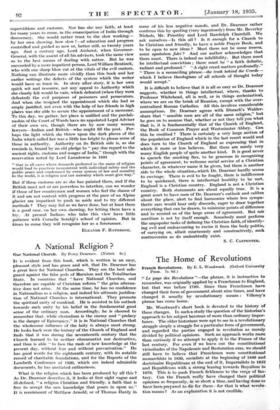A National Religion ?
Our National Church. By Percy Dearmer. (Nisbet. 6s.) IT is evident from this book, which is written in an easy, pleasant style and has grace and wit, that Dr. Dearmer has
a great love for National Churches. They are the best safe- guard against the false gods of Marxism and the Totalitarian State. In countries that " have National Churches, and
therefore are capable of Christian reform " the grim alterna- tive does not arise. At-the same time, he has no confidence In Nationalism as a religion, and indeed his ultimate justifica- tion of National Churches is international. They promote the spiritual unity of mankind. He is assisted in his outlook towards such unity by his belief in the fundamental good sense of the ordinary man. : Accordingly,- he is cheered to remember that, while clericalism is the enemy and " prelacy is the danger of Episcopacy," it is in National Churches that the wholesome influence of the laity is always most strong. He looks hack' over the history of the Church of England and finds that it was during the seventeenth- century that the Church learned to be neither obscurantist nor destructive, and thus is able to face the rush. of-new knowledge at the present day, without fear and without prevarication." He has good words for the eighteenth century, with its notable record of charitable foundations, and for the Reports of the Lambeth Conference of 1930, which are indeed admirable documents, he has unstinted enthusiasm.
What is the religion which has been produced by all this ? As Dr. Dearmer describes it, it looks at first sight vague and ill-defined, a religion Christian and friendly, a faith that is free to accept the new knowledge that pours in upon us." It is reminiscent of Matthew Arnold, or of Thomas Hardy in
some of his less negative moods, and Dr. Dearmer rather confirms this by quoting (very- ingeniously) from Mr. Beverley Nichols, Mr. 'Priestley and Lord Randolph Churchill. We ask ourselves—Is this all ? Is it enough for a Church to be Christian and friendly, to have a noble Prayer Book, and to be open to new ideas ? Must there not be some tessera, some symbolum Nei? And our author acknowledges that there must. There is indeed no infallibility. But there must be intellectual conviction ; there must be " a faith definite, radiant and profound." "A right creed matters profoundly." " There is a reconciling phrase—the truth behind the Creeds— which I believe theologians of all schools of thought today would accept."
It is difficult to believe that it is all so easy as Dr. Dearmer suggests, - whether in things intellectual, where, thanks to Professor Whitehead, all is well, or in things ecclesiastical, where we are on the brink of Reunion, except with the over- centralized Roman Catholics. All this involves considerable assumptions. Dr. Dearmer agrees -with Disraeli's Walder-, Share that " sensible men are all of the same religion," but he goes on to assume that, whether or not they tell you what that is, it is fundamentally that of the Church of England, the Book of Common Prayer and Westminster Abbey. Can this be credited ? There is certainly a very large section of the population of England which in the last resort would and does turn to the Church of England as expressing that in which it more or less believes. But there are surely very many English people of quite another kind. It is good never to quench the smoking flax, to be generous in recognizing points of agreement, to welcome social service of a Christian character, in whatever name it be given, but there is another side to the whole situation,. which Dr. Dearmer hardly seems to envisage. There is evil to be fought, there is indifference to be quickened, there is intellectual hostility to be met. Vngland is a Christian country. England is not a Christian country. Both statements are about equally true. It is a great asset to have men of Dr. Dearmer's outlook and calibre about the place, alert to find harmonies where less sympa- thetic ears would hear only discords, eager to draw together everything that can be drawn, to minimize points of difference and to remind us of the large areas of agreement. But tale auxilium is not by itself enough. Somebody must perform the unpopular tasks of defining the Christian faith, of identify- ing evil and endeavouring to excise it from the body politic, of carrying on, albeit courteously and constructively, such controversies as do undoubtedly exist.
S. C. CARPENTER.






































 Previous page
Previous page